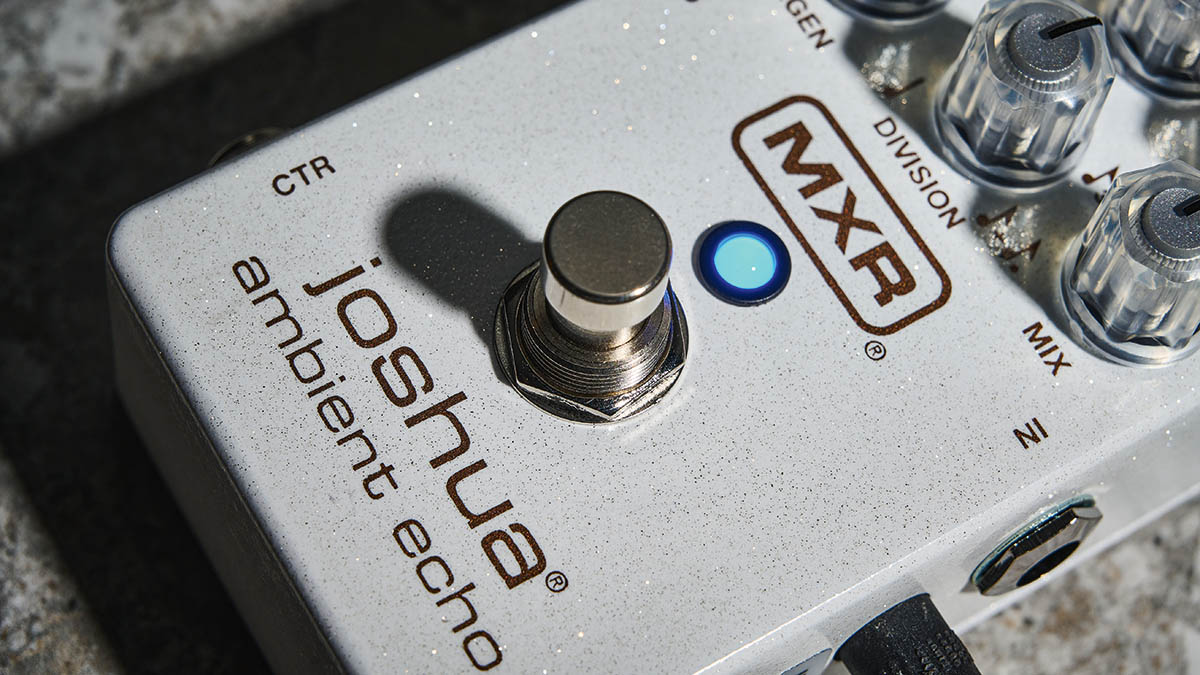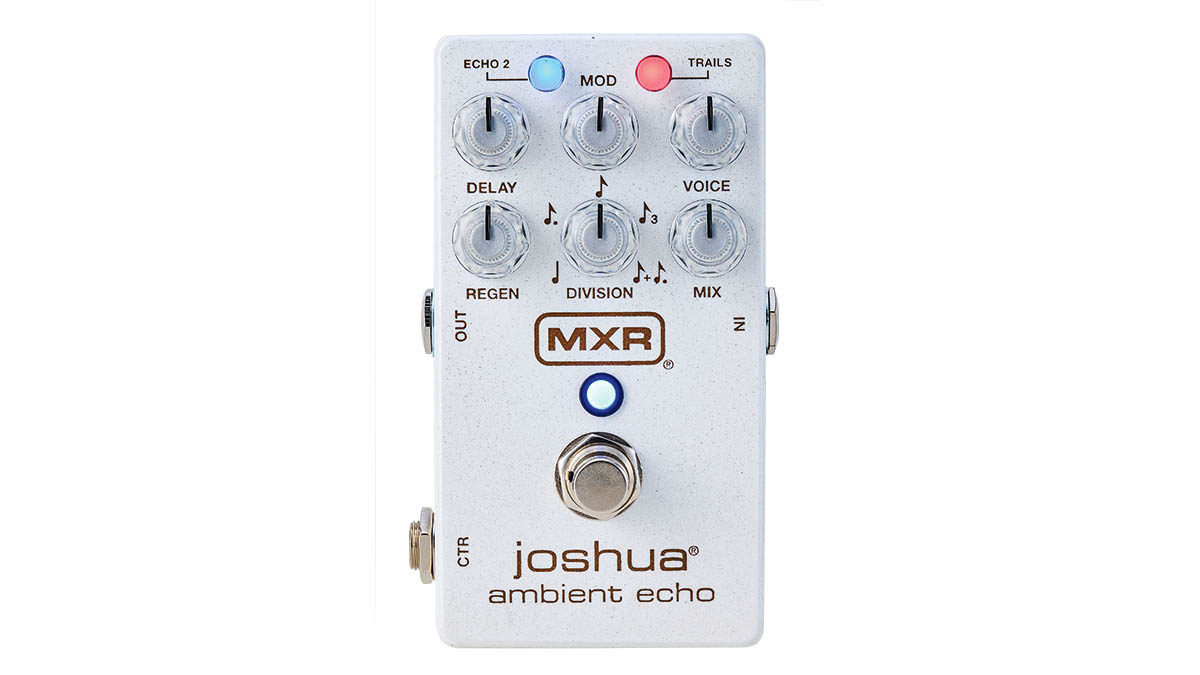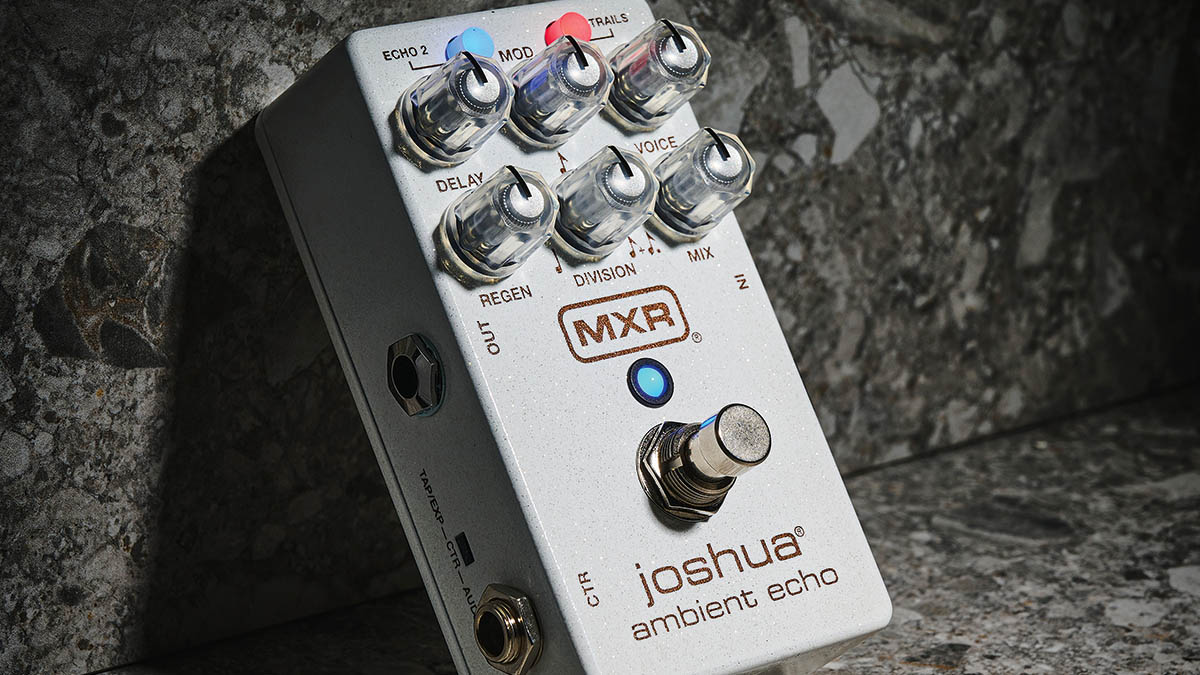Guitar World Verdict
The M309 Joshua Ambient Echo is a feature-packed pedal that belies its compact size. Use it as a traditional delay or as a soundscape generator. It excels as both.
Pros
- +
Compact size.
- +
Great range of straight and esoteric delay sounds.
- +
Practical feature set.
- +
Tap tempo.
- +
Expression pedal capability.
- +
Optional stereo output.
Cons
- -
While welcome, a range of 12 secondary functions accessed via pressing and holding buttons can be a bit fiddly.
You can trust Guitar World
Tuned by Jeorge Tripps to deliver the sort of iconic soundscapes created by vintage rack-style processing, so says MXR, the Joshua Ambient Echo features rhythmic delays with an optional second echo, modulation, octave voicing on the repeats and tap tempo.
Its name, of course, is a not-so-subtle nod to U2 classic The Joshua Tree, so Edge-esque ambience is very much on the cards.
The new pedal is set up by default as mono in/mono out, but it can be switched to stereo output.
While there is the expected trio of Delay Time, Regen (Feedback) and Mix knobs, you can also set the delay time via tap tempo from the pedal itself or an external tap footswitch.
A Division knob sets the rhythmic tap value of the repeats so you can have a straight quarter-note, dotted eighth note, eighth note, eighth-note triplet or a double delay with an eighth note and a dotted eighth.

Things get more complex if you engage the front-panel button that brings in a second set of repeats (Echo 2), set by default to a quarter-note but changeable to another value along with other adjustable parameters.
At its most basic, you can set the Joshua to its quarter-note division and use it like any traditional delay pedal
The upshot of all this is that there’s a great selection of multitap patterns to be found onboard, which can be used as prominent Edge-style rhythmic delays or as a diffuse trail of spacey, ethereal ambience.
All the latest guitar news, interviews, lessons, reviews, deals and more, direct to your inbox!
Adding further to the sonic stew is a Modulation knob that moves from subtly dusting the repeats to rich pitch vibrato, while the Voice knob progressively mixes in a blend of three octaves – one down and one and two up – that thickens the texture of the repeats and can sound like a shimmery organ pad embedded in the trail. There’s also reverb that’s adjustable as a secondary parameter.
For performance scenarios, you can plug in an expression pedal to control all parameters simultaneously, or there’s also the possibility of using an external tap switch to freeze the delay lines at maximum feedback, giving you a bed to play over.
Verdict
The M309 Joshua Ambient Echo is a feature-packed pedal that belies its compact size. At its most basic, you can set the Joshua to its quarter-note division and use it like any traditional delay pedal, with the 50 millisecond to one-second delay times covering all your standard applications.
While that confirms it as a practical purchase, it’s all the other features that make it an especially creative pedal, encouraging you to dive in and explore with a set of controls that will dial in an outstanding range of atmospheric, textural delays – all with onstage adjustment on the fly.
Specs

- PRICE: $239/£269
- ORIGIN: USA
- TYPE: Delay pedal
- FEATURES: True or Buffered (Trails) bypass, 50ms to 1000ms delay time,Atap tempo, stereo output (with TRS cable), adjustable low pass filter in the delay feedback
- CONTROLS: Delay, Mod, Voice, Regen, Division, Mix, Echo 2 switch, Trails switch, CTR mode switch, Bypass footswitch
- CONNECTIONS: Standard input, standard TRS output, CTR input
- POWER: Supplied 9V DC adaptor 250mA
- DIMENSIONS: 64 (w) x 110 (d) x 50mm (h)
- CONTACT: Jim Dunlop
Trevor Curwen has played guitar for several decades – he's also mimed it on the UK's Top of the Pops. Much of his working life, though, has been spent behind the mixing desk, during which time he has built up a solid collection of the guitars, amps and pedals needed to cover just about any studio session. He writes pedal reviews for Guitarist and has contributed to Total Guitar, MusicRadar and Future Music among others.


